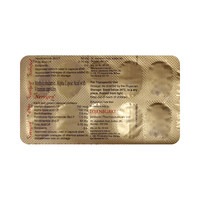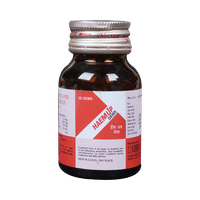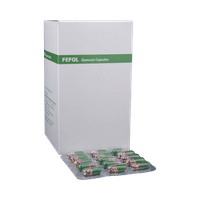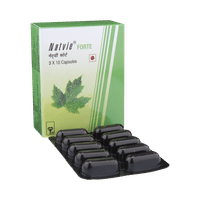Rs.63for 1 strip(s) (15 tablet sr each)
food interaction for Glycomet Tablet SR
alcohol interaction for Glycomet Tablet SR
pregnancy interaction for Glycomet Tablet SR
lactation interaction for Glycomet Tablet SR
food
alcohol
pregnancy
lactation
Glycomet 1gm Tablet SR should be taken with or after food.
None
None
CAUTION
It is unsafe to consume alcohol with Glycomet 1gm Tablet SR
UNSAFE
Glycomet 1gm Tablet SR is generally considered safe to use during pregnancy. Animal studies do not indicate harmful effects. However, there are limited human studies.
SAFE IF PRESCRIBED
Glycomet 1gm Tablet SR should be used with caution during breastfeeding. Breastfeeding should be held until the treatment of the mother is completed and the drug is eliminated from the body.
CAUTION
SALT INFORMATION FOR Glycomet 1000mg Tablet SR
Metformin(1000mg)
Glycomet tablet sr uses
{med_name} is used in the treatment of type 2 diabetes mellitus and polycystic ovarian syndrome (PCOS). It is used in addition to diet and exercise to improve blood sugar control in adults with type 2 diabetes.
How glycomet tablet sr works
Glycomet 1gm Tablet SR is an anti-diabetic medication (biguanide). It works by lowering glucose production in the liver, delaying the absorption of sugar (glucose) from the intestines, and increasing the body's sensitivity to insulin. In PCOS, Glycomet 1gm Tablet SR improves insulin sensitivity, lowering insulin and androgen levels and restoring ovulation and menstrual regularity. Reducing insulin resistance helps manage acne, excess hair growth, weight, and diabetes risk, making it effective for both metabolic and reproductive symptoms.
Common side effects of glycomet tablet sr
Diarrhea, Headache, Vomiting, Nausea, Abdominal discomfort
SUBSTITUTES FOR Glycomet Tablet SR
241 Substitutes
241 Substitutes
Sorted By
 Rs. 43.08pay 3% more per Tablet SR
Rs. 43.08pay 3% more per Tablet SR Rs. 64.83pay 3% more per Tablet SR
Rs. 64.83pay 3% more per Tablet SR Rs. 64.73pay 3% more per Tablet SR
Rs. 64.73pay 3% more per Tablet SR Rs. 63.74pay 1% more per Tablet SR
Rs. 63.74pay 1% more per Tablet SR Rs. 64.89pay 3% more per Tablet SR
Rs. 64.89pay 3% more per Tablet SR
Expert advice FOR Glycomet Tablet SR
- The chances of weight gain and low blood sugar are lower with this medicine as compared to other diabetes medicines.
- Hypoglycemia (low blood sugar level) may occur when taken along with other antidiabetic medicines or alcohol, or on delaying/skipping a meal. Carry a sugar source with you for immediate relief.
- Tell your doctor immediately if you experience any deep or rapid breathing, persistent nausea, vomiting, and stomach pain, as Metformin may cause a rare but serious condition called lactic acidosis, which is an excess of lactic acid in the blood.
- Prolonged use of Metformin may lead to vitamin B12 deficiency, which may lead to anemia, causing fatigue, pale skin, shortness of breath, or headache. Notify your doctor if you experience any of these, as you may require supplements.
- Your doctor will monitor your blood sugar levels and kidney function regularly while you are taking this medication.
Frequently asked questions FOR Glycomet 1000mg Tablet SR
Metformin
Q. What does Glycomet 1gm Tablet SR do exactly?
Glycomet 1gm Tablet SR works in PCOS by making the body more sensitive to insulin. In PCOS, the body often doesn’t respond well to insulin, leading to high insulin levels. This can cause the ovaries to produce excess male hormones, leading to irregular periods, acne, and unwanted hair growth. Glycomet 1gm Tablet SR lowers insulin levels, helping to balance hormones, regulate periods, and reduce these symptoms.<br><br>For type 2 diabetes, Glycomet 1gm Tablet SR helps control blood sugar levels in three ways: it reduces the amount of sugar the liver makes, helps the body use insulin more effectively, and lowers sugar absorption from food. This helps prevent blood sugar spikes and manage diabetes better.
Q. What are the benefits of taking Glycomet 1gm Tablet SR?
Glycomet 1gm Tablet SR benefits polycystic ovary syndrome (PCOS) by improving how the body responds to insulin, lowering insulin levels, and reducing excess male hormone production. This helps restore hormonal balance, regulate menstrual cycles, and relieve symptoms like acne and excess hair growth. It also supports weight management and lowers the risk of type 2 diabetes. Additionally, Glycomet 1gm Tablet SR controls blood sugar by enhancing the body's insulin response, reducing sugar production in the liver, and limiting sugar absorption from the intestines. Unlike some other antidiabetic medicines, it rarely causes low blood sugar when taken alone.
Q. Does Glycomet 1gm Tablet SR cause weight loss?
Yes, Glycomet 1gm Tablet SR has been shown to cause mild weight loss in some people. It may also cause a modest loss in weight in those overweight and obese individuals who are at risk for diabetes. In addition, patients who are sensitive or resistant to insulin may also show weight loss. But, do not start taking this medicine for weight loss on your own. Consult your doctor for the same.






















